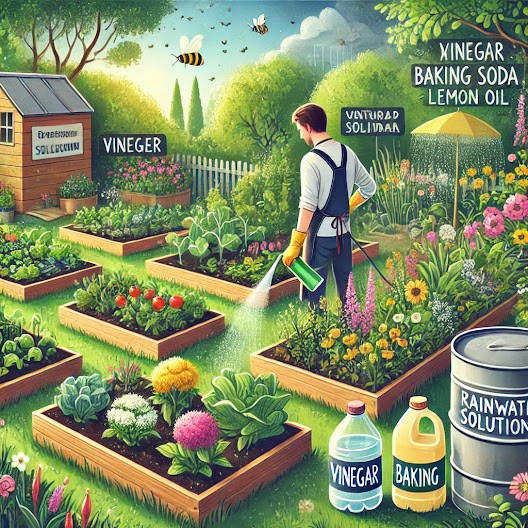Safe & Eco-Friendly Garden Hacks: Natural Solutions for Every Need
Switching to natural, non-toxic solutions for your garden is easier than you think. However, safety should always come first. Some natural remedies can be harmful if misused. Here’s a guide on how to use them effectively while prioritizing safety.
 |
| eco-friendly garden featuring natural solutions like vinegar, baking soda, and lemon oil. |
1. Vinegar (White or Apple Cider)
Uses & Safety:
- Weed Killer – Spray full-strength white vinegar directly on weeds. Best for sidewalks, driveways, and gravel areas. Avoid spraying near desired plants as it kills all vegetation.
- Ant & Pest Repellent – Spray vinegar along ant trails and garden perimeters. Avoid direct application on plants.
- Fungus Control – Mix 1 tbsp vinegar with 1 gallon of water and spray plants sparingly. Overuse can harm plants.
- Soil Acidifier – For acid-loving plants like azaleas and blueberries, mix 1 cup vinegar with 1 gallon of water. Use cautiously to avoid soil imbalance.
- Tool Cleaner – Soak rusted tools overnight, scrub, and rinse thoroughly.
- Slug & Snail Deterrent – Spray garden borders to keep pests away.
🛠 DIY Vinegar Weed Killer:
- 1 gallon white vinegar
- 1 cup salt
- 1 tbsp dish soap
- Mix and spray on weeds (avoid desirable plants).
2. Lemon Oil
Uses & Safety:
- Natural Insect Repellent – Deters aphids, ants, and spiders. Avoid applying in direct sunlight to prevent leaf burn.
- Tool Polish & Rust Prevention – Wipe metal tools with lemon oil.
- Gnat & Fruit Fly Control – A few drops of lemon oil in a dish of water traps pests safely.
🛠 DIY Lemon Pest Spray:
- 10 drops lemon essential oil
- 1 quart water
- A few drops dish soap
- Spray on leaves and soil in the evening to avoid sun damage.
3. Baking Soda
Uses & Safety:
- Fungus & Powdery Mildew Control – Mix with water and spray affected plants. Test on a small area first to ensure plants tolerate it.
- Soil pH Balancer – Sprinkle lightly for plants needing alkalinity. Overuse can harm soil microbiomes.
- Compost Odor Neutralizer – Reduces bad smells in compost bins. Use sparingly.
🛠 DIY Fungicide Spray:
- 1 tbsp baking soda
- 1 gallon water
- 1 tsp mild dish soap
- Spray affected leaves in the early morning or evening.
4. Rubbing Alcohol (Isopropyl, 70%)
Uses & Safety:
- Mealybug & Aphid Killer – Dab directly on pests or dilute and spray. Avoid overuse, as it can dry out plants.
- Sanitizing Pruning Tools – Prevents disease spread between plants. Rinse tools thoroughly after disinfecting.
🛠 DIY Pest Wipe:
- Mix equal parts rubbing alcohol and water.
- Dip a cotton swab and apply to infested areas.
5. Bleach (Use with Extreme Caution!)
Uses & Safety:
- Tool Disinfectant – Kills bacteria and fungi on shears, pots, and containers. Rinse thoroughly after soaking.
- Moss & Algae Killer – Cleans garden paths and patio stones. Do not use near plants.
🛠 DIY Bleach Disinfectant:
- 1 part bleach
- 9 parts water
- Soak tools for 10 minutes, then rinse thoroughly.
⚠ Warning: Never mix bleach with vinegar or ammonia!
6. Borax
Uses & Safety:
- Ant Control – Mixed with sugar, it attracts and kills ants. Keep away from pets and children.
- Weed Control – Sprinkle in driveway and sidewalk cracks. Avoid contact with garden soil.
🛠 DIY Ant Killer:
- 1/2 cup sugar
- 1 1/2 tbsp borax
- 1 1/2 cups warm water
- Mix, soak cotton balls, and place near ant trails.
7. Other Safe Eco-Friendly Garden Solutions
- Hydrogen Peroxide – Oxygenates soil, treats root rot. Use in low concentrations (1 tbsp per gallon of water).
- Epsom Salt – Enhances plant growth but should not be overused. Dissolve 1 tbsp in 1 gallon of water and apply monthly.
- Coffee Grounds – Natural fertilizer, but apply sparingly to avoid over-acidification. Spread thinly around plants.
- Banana Peels – Excellent compost material for potassium. Chop and bury near plants.
- Wood Ash – pH adjuster, but should not be used on acid-loving plants. Sprinkle lightly on soil.
- Molasses – Boosts soil microbes, but use in diluted form (1 tbsp per gallon of water).
- Cornmeal – Prevents fungal diseases, safe for lawns and gardens. Apply a thin layer around plants.
- Cinnamon – Natural antifungal and pest deterrent. Dust lightly on seedlings.
- Eggshells – Provide calcium and deter slugs. Crush and scatter around plants.
- Rice Water – A mild fertilizer, but should be used fresh. Pour around plant bases.
- Neem Oil – Organic pesticide and fungicide, safe for pollinators if applied correctly. Dilute and spray in the evening.
By incorporating these natural solutions, you can maintain a safe, eco-friendly garden without harsh chemicals. Do you use any other sustainable gardening hacks? Let us know in the comments!
🌿 For more safe and sustainable gardening tips, follow Sustainable Solutions Studio!









Comments
Post a Comment